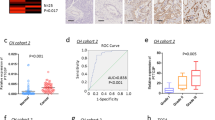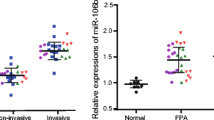Abstract
Early cancer metastases often occur in cervical cancer (CC) patients, resulting in poor prognosis and poor therapeutic outcome after resection of primary cancer. Hence, there is a compelling requirement for elucidating the molecular mechanisms underlying the CC cell invasiveness. Recently, the role of microRNAs (miRNAs) and pituitary tumor-transforming gene 1 (Pttg1) in the carcinogenesis of CC has been reported. Nevertheless, the relationship between miRNAs and Pttg1 remains ill-defined. Here, we showed that the levels of miR-3666 were significantly decreased and the levels of zinc finger E-box binding homeobox 1 (ZEB1) and Pttg1 were significantly increased in the CC specimens from patients, compared to the paired non-tumor tissue. Moreover, the levels of miR-3666 and ZEB1 inversely correlated. Bioinformatics analyses showed that miR-3666 targeted the 3′-untranslated region (3′-UTR) of ZEB1 messenger RNA (mRNA) to inhibit its translation, which was confirmed by luciferase reporter assay. Moreover, Pttg1 overexpression inhibited miR-3666 and subsequently increased ZEB1 and cell invasion, while Pttg1 depletion increased miR-3666 and subsequently decreased ZEB1 and cell invasion. Together, our data suggest that Pttg1 may increase CC cell metastasis, possibly through miR-3666-regulated ZEB1 levels.






Similar content being viewed by others
References
Kanayama T, Mabuchi S, Fujita M, Kimura T. Calcaneal metastasis in uterine cervical cancer: a case report and a review of the literature. Eur J Gynaecol Oncol. 2012;33:524–5.
Setoodeh R, Hakam A, Shan Y. Cerebral metastasis of cervical cancer, report of two cases and review of the literature. Int J Clin Exp Pathol. 2012;5:710–4.
Peters P, Bandi H, Efendy J, Perez-Smith A, Olson S. Rapid growth of cervical cancer metastasis in the brain. J Clin Neurosci. 2010;17:1211–2.
Chen B, Zhang C, Dong P, Guo Y, Mu N. Molecular regulation of cervical cancer growth and invasion by VEGFA. Tumour Biol. 2014;35:11587–93.
Hu Q, Tong S, Zhao X, Ding W, Gou Y, Xu K, et al. Periostin mediates TGF-beta-induced epithelial mesenchymal transition in prostate cancer cells. Cell Physiol Biochem. 2015;36:799–809.
Sa Y, Li C, Li H, Guo H. Timp-1 induces alpha-smooth muscle actin in fibroblasts to promote urethral scar formation. Cell Physiol Biochem. 2015;35:2233–43.
Lan A, Qi Y, Du J. Akt2 mediates TGF-beta1-induced epithelial to mesenchymal transition by deactivating GSK3beta/snail signaling pathway in renal tubular epithelial cells. Cell Physiol Biochem. 2014;34:368–82.
Teng Y, Zhao L, Zhang Y, Chen W, Li X. Id-1, a protein repressed by mir-29b, facilitates the TGFbeta1-induced epithelial-mesenchymal transition in human ovarian cancer cells. Cell Physiol Biochem. 2014;33:717–30.
Schmalhofer O, Brabletz S, Brabletz T. E-cadherin, beta-catenin, and ZEB1 in malignant progression of cancer. Cancer Metastasis Rev. 2009;28:151–66.
Di Leva G, Croce CM. MiRNA profiling of cancer. Curr Opin Genet Dev. 2013;23:3–11.
Pereira DM, Rodrigues PM, Borralho PM, Rodrigues CM. Delivering the promise of miRNA cancer therapeutics. Drug Discov Today. 2013;18:282–9.
Mei Q, Li F, Quan H, Liu Y, Xu H. Busulfan inhibits growth of human osteosarcoma through miR-200 family microRNAs in vitro and in vivo. Cancer Sci. 2014;105:755–62.
Wang F, Xiao W, Sun J, Han D, Zhu Y. MiRNA-181c inhibits EGFR-signaling-dependent MMP9 activation via suppressing akt phosphorylation in glioblastoma. Tumour Biol. 2014;35:8653–8.
Liu G, Jiang C, Li D, Wang R, Wang W. MiRNA-34a inhibits EGFR-signaling-dependent MMP7 activation in gastric cancer. Tumour Biol. 2014;35:9801–6.
Yu R, Ren SG, Horwitz GA, Wang Z, Melmed S. Pituitary tumor transforming gene (PTTG) regulates placental JEG-3 cell division and survival: evidence from live cell imaging. Mol Endocrinol. 2000;14:1137–46.
Caporali S, Alvino E, Levati L, Esposito AI, Ciomei M, Brasca MG, et al. Down-regulation of the pttg1 proto-oncogene contributes to the melanoma suppressive effects of the cyclin-dependent kinase inhibitor pha-848125. Biochem Pharmacol. 2012;84:598–611.
Vlotides G, Eigler T, Melmed S. Pituitary tumor-transforming gene: physiology and implications for tumorigenesis. Endocr Rev. 2007;28:165–86.
Tfelt-Hansen J, Kanuparthi D, Chattopadhyay N. The emerging role of pituitary tumor transforming gene in tumorigenesis. Clin Med Res. 2006;4:130–7.
Huang S, Liao Q, Li L, Xin D. Pttg1 inhibits SMAD3 in prostate cancer cells to promote their proliferation. Tumour Biol. 2014;35:6265–70.
Zhang G, Zhao Q, Yu S, Lin R, Yi X. Pttg1 inhibits TGFbeta signaling in breast cancer cells to promote their growth. Tumour Biol. 2015;36:199–203.
Lin YH, Tian Y, Wang JS, Jiang YG, Luo Y, Chen YT. Pituitary tumor-transforming gene 1 regulates invasion of prostate cancer cells through mmp13. Tumour Biol. 2015. doi:10.1007/s13277-015-3796-1.
Chen B, Hou Z, Li C, Tong Y. MiRNA-494 inhibits metastasis of cervical cancer through Pttg1. Tumour Biol. 2015. doi:10.1007/s13277-015-3440-0.
Pattillo RA, Hussa RO, Story MT, Ruckert AC, Shalaby MR, Mattingly RF. Tumor antigen and human chorionic gonadotropin in caski cells: a new epidermoid cervical cancer cell line. Science. 1977;196:1456–8.
Puck TT, Marcus PI, Cieciura SJ. Clonal growth of mammalian cells in vitro; growth characteristics of colonies from single hela cells with and without a feeder layer. J Exp Med. 1956;103:273–83.
Conflicts of interest
None
Author information
Authors and Affiliations
Corresponding author
Rights and permissions
About this article
Cite this article
Li, L., Han, LY., Yu, M. et al. Pituitary tumor-transforming gene 1 enhances metastases of cervical cancer cells through miR-3666-regulated ZEB1. Tumor Biol. 37, 15567–15573 (2016). https://doi.org/10.1007/s13277-015-4047-1
Received:
Accepted:
Published:
Issue Date:
DOI: https://doi.org/10.1007/s13277-015-4047-1




